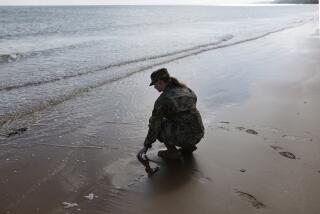Jack Davis, 108; Britain’s Oldest WWI Veteran Was in Demand as Speaker
- Share via
He bowed to six monarchs over three centuries, and lived to mourn almost all of the 5 million Britons who fought with him in the war to end all wars, from 1914 to 1918.
“They shall grow not old as we that are left grow old; age shall not weary them, nor the years condemn. At the going down of the sun and in the morning, we will remember them,” his voice boomed out strongly in a typical Flanders Fields observance in Belgium last year.
Jack Davis, long recognized as Britain’s oldest World War I veteran, died Sunday in a nursing home in Stoke Hammond, Buckinghamshire, England. He was 108.
Davis, who saw four generations of his family born and his two sons fight in World War II, remained articulate until near the end of his life, and was in great demand at ceremonies honoring the dwindling veterans of the Great War.
A wine steward at the posh National Liberal Club, the 19-year-old London native volunteered for duty when the war was declared.
He went into the 6th Battalion Duke of Cornwall Light Infantry, seeing battle in every major engagement on the western front.
Recently, at a meeting he had requested with the hereditary commander in chief of his regiment, the centenarian asked “You’re the Duke of Cornwall, did you know that?”
Prince Charles, the heir to the British throne, replied that, yes, he was aware he held the Cornwall title, and asked Davis how he had lived to such a remarkable age.
“I had a charmed life. I dodged everything,” Davis quipped.
The meeting in April occurred at a final group reunion of the World War I Veterans Assn. With the death of Davis, the eldest member and former association president, only 34 members remain alive and organizers consider them too frail for future gatherings.
Dennis Goodwin, chairman of the association, described Davis as “determined and resilient” and said he had “a resourcefulness, an enjoyment of life and positive outlook.” Goodwin said Davis was a favorite of other veterans.
At the time, British and American forces were at war in Iraq. When the media asked Davis what he thought of that conflict, he replied simply, “We were meant to stop all this fighting.”
“Has this, World War I,” he added, “ever been justified? For what?”
Davis, according to his family, refused to talk for many years about the wartime horrors he endured nearly nine decades ago. But he has discussed his memories more recently at ceremonies for fallen comrades.
“I’ve been to reunions. I’ve been to Paris and I’ve laid wreaths here, there and everywhere. I have a picture of Ypres [Belgium] as it was left, you know -- hardly a tree or a house left standing,” he said in 2001, appalled that the BBC was contemplating a television reality show about trench warfare in World War I.
It was in Ypres last year that Davis was asked to deliver the ringing last exhortation for slain soldiers at a 75th anniversary of the Menin Gate Memorial. The memorial straddles a main road in the town, a battleground and route to the front.
Davis spent six months in the trenches at Ypres, and saw a whole company of men blown up by German guns.
“They were disgusting, distressing conditions,” he said in April.
“There was no drainage; we were invariably knee deep -- thigh deep -- in mud and water in the trenches and we were told about the importance of our positions. It was a key point to guard the channel.”
Among trench warfare’s “appalling conditions,” he said, were mud, rats, meager rations, no change of clothes, sleep deprivation, sounds of bombardment, mustard gas, rotting corpses, and worst of all, haunting cries of fatally wounded comrades lying in no man’s land pleading to be put out of their misery.
Ironically, his outlook brightened one day, Davis said, when he was assigned dangerous messenger duty.
Communicating with the front lines, he said, “meant scrambling over the top and running, dodging shell holes 10 to 15 yards across up to the line. As I approached the front line, I heard someone say, ‘I recognize that voice!’ ” Davis had found his two soldier brothers whom he hadn’t seen in six months.
“There was great comradeship,” Davis said last year at the Menin Gate ceremony, “but it was bought at a terrible price. I can’t say that there’s a day goes by when I don’t think of all my mates who copped it.”
Davis barely escaped the bloody battle of Somme, France, in 1916, where 57,000 soldiers were killed at the start of the offensive.
“I wasn’t able to stand, let alone fight, I had a high temperature and I was delirious,” he explained in April. A day before the battle, Davis had come down with the dreaded trench fever, which he always believed had saved his life.
Yet Davis had never questioned surviving the war.
“I had a strong sense of self-preservation,” he said two years ago, “keeping a clear head at the most dangerous times and never taking undue risks, and it stood me in good stead right the way through.”
More to Read
Sign up for Essential California
The most important California stories and recommendations in your inbox every morning.
You may occasionally receive promotional content from the Los Angeles Times.










